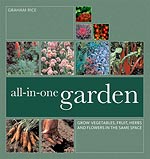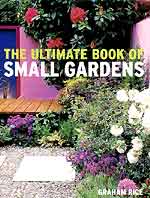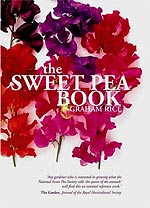
Profile - Joy Larkcom
Her name could not be more appropriate. No one called Joy Larkcom could ever be sombre or dour and Joy is one of the most naturally spirited, genuinely enthusiastic and warm-hearted of people. And a true horticultural pioneer.
Joy is a garden writer in the best sense. She grows an extraordinary range of vegetables on the smallholding around her Suffolk farmhouse and then writes about her experiences in growing them. She travels the world to discover what other people are growing in far flung corners, brings back seeds, grows them, tastes the results and works out which are worth growing here in Britain and the best way to go about it. She is fixed fast on the idea that you should only write about what you know, and believes that simply passing on hearsay and old wives' tales swindles her readers and the people who hear her lecture.
So she ensures that she has the experiences to pass on, setting out to find which varieties are the best and how to grow them well - organically. For as long as I can remember, and long before you could buy organic potatoes in the supermarket, Joy has been campaigning for organic growing and her persistence is one of the reasons we can now buy organically grown vegetable seeds and that we find so much organic produce in the shops.
Research
Joy cheerfully admits that neither her Suffolk garden, nor her study, could be described as especially tidy - you have to be a little careful where you step when you enter either. In her garden, there is a summer and a winter potager, narrow raised beds with paths of old carpet between, polythene tunnels and a mixture of familiar British vegetables and completely mystifying plants which Joy picks and offers even the most suspicious visitor to taste.
She seems to relish the transition from nervous scepticism to delighted enjoyment in the short time between visitors suspiciously spying the proffered leaves and tasting.
There are labels everywhere in the garden, each marked with details of sowing dates and pricking out dates - invaluable for later reference. Small patches of mysterious leaves or tomatoes from another continent grow through the chunky mulch and, it cannot be denied, there are also weeds and self-sown plants taking their chances by paths and in unexpected corners. But then even chickweed can take its place in a salad.
Growing in a rough and ready way is part of the testing process... if plants thrive in the unpredictable and sometimes hurried care of a gardener on the go they'll thrive anywhere.
In her study boxes bursting with notes, decades of seed catalogues from around the world, last year's labels with their invaluable inscriptions, notebooks full of observations and more are piled high - perhaps with a cat curled amongst them.
Europe and China
Joy discovers and disseminates and her inquisitive passion for vegetables has influenced us all. Following a year-long caravan tour of Europe in 1976, with her husband Don and their two children, she introduced Lollo Rosso lettuce from Italy along with a range of other varieties she found on their travels and then good naturedly, but persistently, badgered and cajoled the seed companies into listing what are now basic varieties in their catalogues.
She pioneered the cut-and-come-again salads we now see packed in bags on our supermarket shelves, testing different blends of varieties and experimenting on when to cut them and how often they'll stand the clip. Through the experience of supplying restaurants from her garden she was able to talk to larger scale growers about varieties and techniques and so change the way we eat salads; wan lettuce leaves, quartered tomatoes and peeled and sliced cucumbers are never seen grouped on her plates in a traditional British salad.
She popularised heirloom tomatoes being determined, in an age of hybrids bred for shelf-life and resistance to damage in transit, that flavour should be all important. I know a number of people who grow the splendidly named 'Britain’Äôs Breakfast' as a result of her enthusiasm.
Following a long trip to China, she introduced a wide range of Chinese vegetables to British gardeners, discovered which were the best varieties for our climate, worked out how to grow them and was again able to work with large scale growers to get them into our shops and with breeders to refine them for British conditions. She even lectured in China, and in Mandarin (having paid her British teacher in goose eggs). She found Oriental vegetables too in the United States, where the Chinese and Korean, Vietnamese and Thai communities grow food from their homeland. And she brought back seed and techniques to try herself.
Her trips to Europe and the United States also alerted her to the value of food which looks good in the garden. The ornamental vegetable gardens now a familiar feature around the country are largely inspired by her ideas and her winter and summer pottagers featuring attractive food crops laid out in attractive patterns have been the trial sites for new varieties, in new associations - often with edible flowers.
Over the years Joy has persisted at what she believes in and persuaded the doubters, describing with cheerful incredulity the rejections of the sceptical then a few years later greeting warmly their eventual conversion.
Joy is the grower of the partnership, husband Don is the chef, and dinner at their farmhouse is a treat in every respect. The pre-prandial tour of the garden, with the theoretical purpose of picking leaves for salads, is lengthened with the assistance of a glass of wine as leaves are tasted and growing is discussed; eventually Don appears from the kitchen to cut short the discussion and hurry along his ingredients. After an unfailingly delicious meal, with salads or stir-frys from the garden, the post-prandial tour has a different purpose. Armed with an empty beer can, tipsy guests may be invited to participate in the most entertaining form of organic pest control - collecting slugs by torchlight. Then guests are sent home with bags of more leaves to try at home.
Lecturing and writing
The result of this wealth of travelling, research, growing, record keeping and insight have been lectures all over the world and articles in publications as diverse as The Observer, where she wrote in tandem with Christopher Lloyd for some years, and Organic Gardening magazine; her current cheerfully informative column is in Kitchen Garden magazine and there's been a series of highly influential books. Even those determinedly packed with facts have a touch of the joyous Joy.
Vegetables from Small Gardens and Salads the Year Round were her first two ground breakers, packed with concise information, and not a word wasted. The best "let's look it up in" vegetable books you'll find. Then she begun her series of revisions of the wartime classic The Vegetable Garden Displayed, adding her experience and insight to the world of more traditional British vegetables. Then came The Salad Garden, Oriental Vegetables, and Creative Vegetable Gardening. A new and completely revised edition of The Salad Garden has recently appeared (March)
Joy is the first to acknowledge the generous help of the gardeners around the world, the growers, the seedsmen, breeders, ecologists and the many people she’Äôs met on her travels who've showed her what they grow and how they grow it. A less good-natured and unselfish person would not have made so many friends. She's just returned from a trip to Costa Rica (Feb/March), her next venture is to Australia. I can't wait to read about the vegetables she brings back, to see them in our supermarkets and our seed catalogues - and to taste them too.
Joy's awards
In 1993 Joy was awarded the Veitch Memorial Medal for her services to horticulture by the RHS, and was also Garden Writer of the Year in 1993. Last year she was photographed by Tessa Traeger for Escape to Eden (Five Centuries of Women Gardeners) at the National Portrait Gallery. In 2001, Joy won two writing awards from the Garden Writers Guild.
Joy's books
Oriental Vegetables
Inspired by her trip to China, this comprehensive book describes the plants, recommends varieties and discusses how to grow them in Western gardens’Ķ and how to cook them too. A highly influential book, Joy's insight and experience is laid out with a light touch but a firm grip on the business in hand - getting the information across clearly. (John Murray, ¬£16)
Creative Vegetable Gardening
This beautiful and inspiring book is great to look at and good to read. Full of ideas showing how vegetables and vegetable gardens can be as attractive as flowers, many of the pictures are from Joy's own garden. (Mitchell Beazley, £16.99)
The Organic Salad Garden
This breakthrough book on growing salads was nominated as a Book of the Century on BBC Radio 4's Food Programme. Newly revised and updated, this is a tempting, juicy book that looks great and is full of Joy’Äôs special flavour. (Frances Lincoln, ¬£14.99)
Salads the Year Round
A great little book, with the clearest advice on achieving exactly what the title says. Not packed with glossy pictures, no fancy design - just years of experience packed between paperback covers. (Ecologic, £5.99 - ring 0117 942 0165 to order)
Read Joy Larkcom
Vegetables from Small Gardens (1976, revised and updated 1995)
Salads the Year Round (1980)
Vegetable Garden Displayed (1982, revised and updated 1994)
Sainsbury's Homebase Guide to Vegetable Gardening (1983)
Observer Good Gardening Guide (1983)
The Salad Garden (1984, revised and updated 2001)
All Muck and magic (1987)
Grow Your Greens, Eat Your Greens (1993)
Salads from Small Gardens (1995, revised and updated version of Salads the Year Round)
Oriental Vegetables (1991)
Creative Vegetable Gardening (1997)









